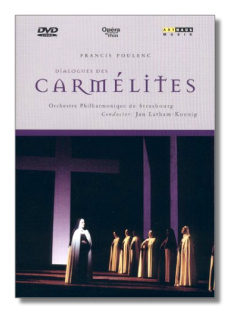
The Internet's Premier Classical Music Source
Related Links
- Poulenc Reviews
- Latest Reviews
- More Reviews
-
By Composer
-
Collections
DVD & Blu-ray
Books
Concert Reviews
Articles/Interviews
Software
Audio
Search Amazon
Recommended Links
Site News
 DVD Review
DVD Review
Francis Poulenc

Dialogues des Carmélites
- Anne-Sophie Schmidt (Blanche de la Force)
- Patricia Petitbon (Soeur Constance)
- Nadine Denize (Madame de Croissy)
- Hedwig Fassbender (Mère Marie)
- Didier Henry (Le chevalier de la Force)
- Laurence Dale (Le marquis de la Force)
- Valérie Millot (Madame Lidoine)
Choeurs de l'Opéra National du Rhin
Orchestre Philharmonique de Strasbourg/Jan Latham-Koenig
Arthaus Musik DVD 100019 149minutes
Francis Poulenc's only full-length opera, which veers towards the talky on CD, is electrifying when seen on stage. This production was filmed "live" in 1999 at the Opéra du Rhin. It is outstanding on several counts. The sets are simple, and this is consistent with Poulenc's original intentions. Jan Latham-Koenig's conducting realizes the power of the score without imposing unnecessary histrionics upon it. The singing is superb, and the acting, if possible, even more so. (French actress Marthe Keller was the director.) Critics who claim opera is not legitimate theater must be silenced by the unforgettable performance that has been preserved here.
Poulenc's opera is based on a play by Georges Bernanos. The setting is revolutionary France and a cloister of Carmelite nuns. Blanche, the daughter of an aristocratic family, is victimized by her own existential fear. In hopes of finding spiritual peace, she is accepted into the cloister. However, fear and death continue to intrude. The mortally ill Prioress experiences her final terrifying moments in Blanche's presence. Revolutionary forces dissolve the cloister as a dangerous remnant of the old social order. Submissive yet dedicated to their faith, the sisters are arrested and take a vow of martyrdom, praying that their deaths will allow the restoration of spiritual grace to France. At the end of the opera, they are guillotined, the sound of their "Salve regina" is extinguished voice by voice. Blanche, who had briefly fled to her home, returns in time to be martyred with her sisters, no longer afraid.
There is little about this opera that is dramatic in the sense of stage action; the word "dialogues" is telling. (Not even the guillotine is shown; the sisters simply drop to the ground from where they are standing at the sound of its thuds.) The opera is a series of pictures and impressions, more like a slide show than a movie, but it is no less overwhelming for all that. Poulenc's music is sweet but not saccharine, conversational but always melodic, and so much so that it would make no sense to extract arias from the score for separate performance. The composer of the Gloria and the Stabat mater is fully in evidence here; the chaste was never so sensual.
Despite the very frequent use of close-ups, the crucial feeling of a staged performance is not diluted. If anything, the production gains immensely from the faces of the singers. As Blanche, Schmidt's expressions tell all, and the sweet young face of Petitbon will linger in the memory, as will the last tortured grimaces of Denize's Prioress. The composition of the shots is not always ideal, but there are few really problematic moments. When the stage is murkily dark (as it quite often is in this production), some digital "grain" is revealed. I am unsure about the use of black-and-white footage in some of the orchestral interludes, and I don't understand the series of stills at the opera's beginning, which seem to refer to a different war and different refugees entirely. Perhaps a hint is offered by Florence Emir's costumes, which evoke current times as much as the late 1700s.
Operas on DVD are still relatively new. This new Arthaus Dialogues should be an early star of this format.
Copyright © 2001, Raymond Tuttle




















